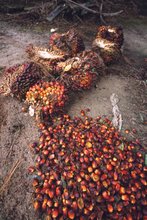By buying products containing unsustainable palm oil, shoppers are unwittingly helping to finance an environmental disaster which is not only accelerating global climate change, but also causing the decimation of one of our closest cousins. They are also contributing to widespread human rights abuses.
During the last 15 years, annual global production of palm oil has trebled. By 2004, Europe was the world’s largest importer of palm oil, making up 17% of the market. In the UK, palm oil is present in 1 in 10 supermarket products – from lipstick to margarine, cereals to soap. It is almost always labelled generically as a “vegetable oil”.
Oil palms produce a greater yield per hectare than any other edible oil (up to ten times that of soya) and palm oil is valued by producers because it is solid at room temperature. Although the plant itself originates from West Africa, the vast majority of palm oil comes from Malaysia and Indonesia, where monoculture plantations are rapidly replacing some of the most bio-diverse areas of rainforest on Earth. After planting, it takes 3-4 years for the palms to become productive, and they have a life expectancy of around 25 years.
Palm oil production is predicted to increase by another 30% by 2010. Demand is increasing from the growing economies of China and India, and the development of palm oil for biofuel could see the crisis skyrocket.
During the last 15 years, annual global production of palm oil has trebled. By 2004, Europe was the world’s largest importer of palm oil, making up 17% of the market. In the UK, palm oil is present in 1 in 10 supermarket products – from lipstick to margarine, cereals to soap. It is almost always labelled generically as a “vegetable oil”.
Oil palms produce a greater yield per hectare than any other edible oil (up to ten times that of soya) and palm oil is valued by producers because it is solid at room temperature. Although the plant itself originates from West Africa, the vast majority of palm oil comes from Malaysia and Indonesia, where monoculture plantations are rapidly replacing some of the most bio-diverse areas of rainforest on Earth. After planting, it takes 3-4 years for the palms to become productive, and they have a life expectancy of around 25 years.
Palm oil production is predicted to increase by another 30% by 2010. Demand is increasing from the growing economies of China and India, and the development of palm oil for biofuel could see the crisis skyrocket.







No comments:
Post a Comment